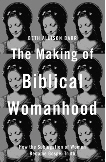The Making Of Biblical Womanhood: How The Subjugation Of Women Became Gospel Truth -- By: Bradley G. Green
Journal: Eikon
Volume: EIKON 04:1 (Spring 2022)
Article: The Making Of Biblical Womanhood: How The Subjugation Of Women Became Gospel Truth
Author: Bradley G. Green
Eikon 4.1 (Spring 2022) p. 162
The Making Of Biblical Womanhood: How The Subjugation Of Women Became Gospel Truth
REVIEWED BY
Bradley G. Green is Professor of Theological Studies at Union University. He also serves as Professor of Philosophy and Theology at The Southern Baptist Theological Seminary and a Senior Fellow at Newton House, Oxford.
Eikon 4.1 (Spring 2022) p. 163

Beth Allison Barr. The Making of Biblical Womanhood: How the Subjugation of Women Became Gospel Truth. Grand Rapids, MI: Brazos Press, 2021.
I was driving one day and turned on NPR. I was clearly tuning in part way through an interview. My ears perked up when I heard something about the Apostle Paul, then something about inerrancy. I thought, “what in the world is this?” Then I heard something about misogyny (or the like), and I thought, “Oh, okay.” I arrived at my destination, turned off the car, and headed in.
Subsequently, I worked out that the interview was with Beth Allison Barr, an Associate Professor of History and Associate Dean of the Graduate School at Baylor University. I am a Baylor alum (Ph.D., 2000), so I was intrigued. The interview was related to her book, The Making of Biblical Womanhood: How the Subjugation of Women Became Gospel Truth.
The book is a mix between (1) an attempt at historical scholarship and (2) an impassioned personal narrative. While the book certainly is an impassioned personal narrative, I wonder if it succeeds as a work of historical scholarship. We might put these two emphases slightly differently and say that this book is more of (1) popular-level historical scholarship in the service of (2) an impassioned personal narrative. To be less charitable (perhaps), what we really have is a kind of emotionally-charged, high-octane attempt to write against complementarianism, with certain soundings in history.
The book is not subtle in its rather highly pitched rhetoric and denunciation of “patriarchy” and all things complementarian. Christians and non
Eikon 4.1 (Spring 2022) p. 164
Christians would have benefitted from a less-heated examination of how women have been treated in history, how the Church has attempted to apply a myriad of biblical passages, and how Christianity — across history — has succeeded or not succeeded in offering a vision of a truly Christian culture, including how women ought to be treated. But Barr has not written that book. So, we must review what was actually written.
To her credit, Barr is quite clear that at least part of Making is a kind of heart-driven reacti...
Click here to subscribe
